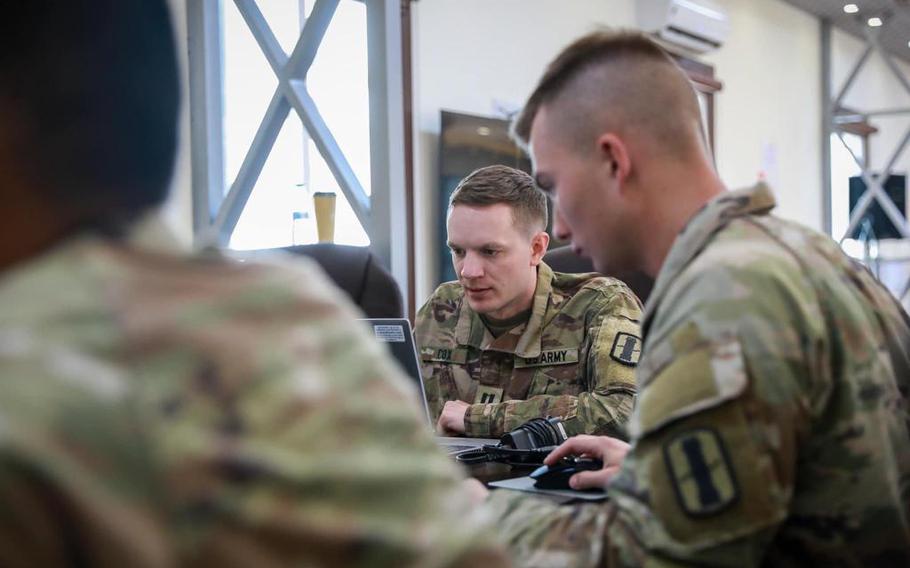
Capt. Graham R. Cox, a soldier with the 197th Field Artillery Brigade deployed to Jordan, competes in the U.S. Army Central Command Best Cyber Warrior Competition, which ran from Oct. 11 to Oct. 13, 2022. (Army)
Cyber warriors active in one of the world’s busiest digital battlefields took up the challenge of securing their networks this week in a competition sponsored by U.S. Army Central.
Some 56 teams from the U.S. military and five Middle Eastern countries worked through such tasks as finding network weak points and reverse-engineering malware as part of the Best Cyber Warrior Competition, which ran Tuesday through Thursday.
The events tested soldiers’ mettle on things they encounter on deployment to the Middle East, said Maj. Kellan Sams, the lead planner for the competition and a lead cyber security officer deployed to Camp Arifjan, Kuwait.
“This helps our cyber readiness capabilities, sharing techniques and honing our skills to better defend our networks against threats,” Sams said Friday.
U.S. troops competed remotely, with some competitors participating while deployed to the Middle East.
The region is a highly contested electronic battlespace, as highlighted by the activities of Israel and Iran.
The rivals have tried to breach each other’s infrastructure, which led to attacks on ports and gas terminal systems in the two countries, The Washington Post reported in July.
Washington sanctioned Iran’s intelligence ministry in September, accusing it of launching a cyberattack that shut down NATO ally Albania’s government services and websites.
The U.S. military command for the Middle East also has been targeted. Hackers reputed to be linked to the Islamic State group in 2015 replaced the profile pictures of CENTCOM’s social media sites with an image of a man with his face covered, and text including the phrase “i love you isis,” The Washington Post reported at the time.
Some 26 teams, or about half the field, came from troops in Kuwait, Jordan, Iraq, Saudi Arabia and Oman.
These countries face many of the same cyberthreats that deployed U.S. troops do, Sams said.
In one challenge, troops were confronted with the aftermath of a cyberattack and had to examine the hardware and digital footprints to figure out what had happened.
In others, cyber soldiers played capture the flag. These are competitions in which teams must defend a network from accessing vulnerabilities.
The competition split the field into divisions based at home and overseas. A team from the Saudi Defense Ministry won the overseas division. A U.S. Army team from Fort Gordon, Ga., won the American division.
This year marked the eighth annual completion of the competition.